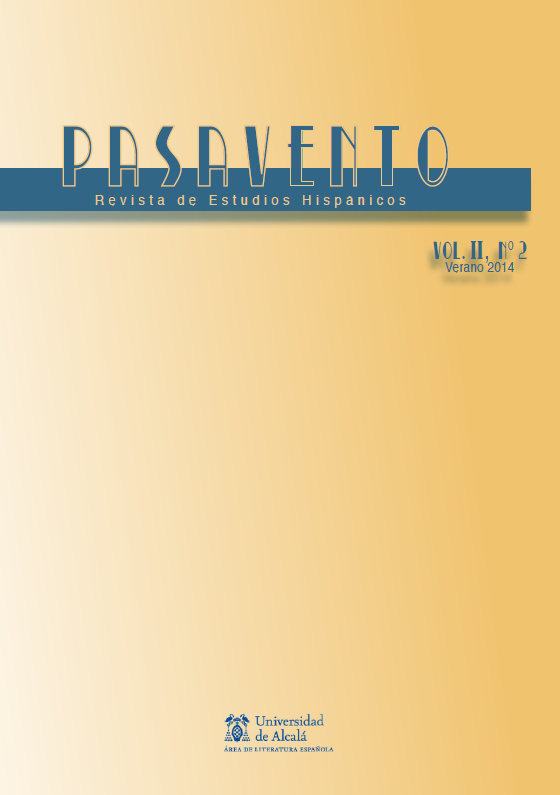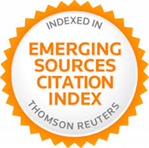"Aprende el difícil" and the National Literatures of the Hispanic Caribbean
DOI:
https://doi.org/10.37536/preh.2014.2.2.1002Keywords:
Latin@ writers, Caribbean Literature, Junot Díaz, Josefina Báez, GlobalizationAbstract
The aim is to study in which way the English language has influenced the (trans)national literatures of Hispanic Caribbean in the context of the discussions on globalization. Whereas Cuban and Puerto Rican literary institutions continue to defend rather a monolingual position, Dominican institutions appear to be more inclined to accept writers such as Junot Díaz or Josefina Báez, who combine in a particular way English and Spanish variants. Moreover, their texts present numerous ambiguities that question geographical, linguistic and cultural classifications. Apart from blurring borders between the anglo and the hispano, they also question the concept of Latin-American literature in a context of globalization.
References
Álvarez, Julia (1991): How the García Girls Lost Their Accents. Nueva York, Plume.
Álvarez, Julia (1995): In the Time of the Butterflies. Nueva York, Plume.
Álvarez, Julia (2000): “Doña Aída, with your permission”. En: Callaloo, vol. 23, n.º 3, pp. 821-823.
Anzaldúa, Gloria (1999): Borderlands/La Frontera. San Francisco, Aunt Lute Books.
Aparicio, Frances, y Chávez-Silverman, Susana (eds.) (1997): Tropicalizations: Transcultural Representations of Latinidad. Hanover, University of New England Press.
Appiah, Kwame Anthony (2006): Cosmopolitanism. Ethics in a World of Strangers. Nueva York, Penguin.
Báez, Josefina (1999): Aquí ahora es Manhattan. Allá antes La Romana. Nueva York, Ediciones Alcance.
Báez, Josefina (2000): Dominicanish. Nueva York, I Ombe.
Báez, Josefina (2008): Comrade, Bliss Ain’t Playing. Nueva York, I Ombe.
Báez, Josefina (2011): Levente no. Yolayorkdominicanyork. Nueva York, Ay Ombe Theatre.
Bautista, Daniel (2008-2009): “Junot Díaz and the Lucha Libre”. En: Sargasso. Quisqueya: la República Extended, vol. II , pp. 41-55.
Benítez Rojo, Antonio (1989): La isla que se repite. El Caribe y la perspectiva posmoderna. Hanover, Ediciones del Norte.
Bhabha, Homi (1994): The Location of Culture. Londres / Nueva York, Routledge.
Boyden, Michael, Goethals, Patrick (2011): “Translating the Watcher’s Voice: Junot Díaz’s The Brief Wondrous Life of Oscar Wao into Spanish”. En: Meta, vol. LVI, n.º 1, pp. 20-41.
Ch’ien, Evelyn (2004): Weird English. Cambridge, Harvard University Press.
Cowart, David (2006): Trailing Clouds. Immigrant Fiction in Contemporary America. Ithaca/Londres, Cornell University Press.
De Maeseneer, Rita (2011): “Junot Díaz y el canon, un ‘canibalismo líquido’”. En: Letral: Revista Electrónica de Estudios Transatlánticos de Literatura, n.º 6, pp. 89-97. Disponible en <http://www.proyectoletral.es/revista/index.php?id_num=7>. Última visita: 01.04.2014.
De Maeseneer, Rita, y Logie, Ilse (2015): “Antologías del cuento dominicano de la última década (2000-2010) y canon”. En: Confluencia, vol. 31, n.º 1, en prensa. Díaz, Junot (1997): Drown. Londres, Faber and Faber.
De Maeseneer, Rita, y Logie, Ilse (2007): The Brief Wondrous Life of Oscar Wao. Nueva York, Riverhead Books.
De Maeseneer, Rita, y Logie, Ilse (2012): This is How You Lose Her. Londres, Faber and Faber.
Durán Almarza, Emilia María (2010): Performeras del Dominicanyork. Josefina Báez y Sherezada Vicioso. Valencia, Universidad de Valencia.
Ette, Ottmar (2005): “Una literatura sin residencia fija. Insularidad, historia y dinámica sociocultural en la Cuba del siglo xx”. En: Revista de Indias, vol. LXV, n.º 235, pp. 729-754.
Figueroa, Ramón A. (2005): “Fantasmas ultramarinos: la dominicanidad en Julia Álvarez y Junot Díaz”. En: Revista Iberoamericana, vol. LXXI, n.º 212, pp. 731-744.
Garland Mahler, Anne (2010): “The Writer as Superhero: Fighting the Colonial Curse in Junot Díaz’s The Brief Wondrous Life of Oscar Wao”. En: Journal of Latin American Cultural Studies, vol. 19, n.º 2, pp. 119-140.
Glissant, Édouard (1997): Traité du Tout-Monde. París, Gallimard. Hundley, Douglas (2007): “Travelling the Guagua Aérea: The Transnational Journeys of Dominicanyork Performance”. En: Performance Research. A Journal of Perfoming Arts, vol. 12, n.º 2, pp. 102-113.
Jay, Paul (2010): Global Matters. The Transnational Turn in Literary Studies. Nueva York, Cornell University Press.
Johnson, Kelli Lyon (2005): Julia Alvarez. Writing a New Place on the Map. Albuquerque, University of New Mexico Press.
Kellas, James (1998). The Politics of Nationalism and Ethnicity. Nueva York, Palgrave-MacMillan.
Khader, Jamil (2003): “Subaltern cosmopolitanism: Community and Transnational Mobility in Caribbean Postcolonial Feminist Writings”. En: Feminist Studies, vol. 29, n.º 1, pp. 63-81.
Lantigua-Williams, Juleyka (2011): “Interview with Junot Díaz”. En: Camino Real. Estudios de las Hispanidades Norteamericanas, vol. 3, n.º 4, pp. 195-204.
Laviera, Tato (1992): La carreta made a U-turn. Houston, Arte Público Press.
López Calvo, Ignacio (2009): “A Postmodern Plátano’s Trujillo: Junot Díaz’s The Brief Wondrous Life of Oscar Wao, more Macondo than McOndo”. En: Antípodas, n.º 20, pp. 75-90.
Ludwig, Ralph, y Röseberg, Dorothee (2010): “Tout-Monde: Kommunikations- und gesellschaftstheoretische Modelle zwishen ‘alten’ und ‘neuen’ Räumen?”. En: Ralph Ludwig y Dorothee Röseberg (eds.): Tout-Monde: Interkulturalität, Hybridisierung, Kreolisierung. Frankfurt am Main, Peter Lang, pp. 11-30.
Maríñez, Sophie (2005): “Poética de la Relación en ‘Dominicanish’ de Josefina Baez”. En: La Torre, vol. X, n.º 35, pp. 149-160.
Mariposa (aka María Teresa Fernández) (s.f.): “Ode to the Diasporican”. En: Boricua Poetry. Disponible en <http://www.virtualboricua.org/Docs/poem_mtf.htm>. Última visita: 07.04.2014.
Méndez, Danny (2012): Narratives of Migration and Displacement in Dominican Literature. Nueva York, Routledge.
Mignolo, Walter (2000): Local Histories/ Global Designs. Coloniality, Subaltern Knowledges, and Border Thinking. Nueva Jersey, Princeton University Press.
Miranda, Katherine (2008-2009): “Junot Díaz, Diaspora, and Redemption: Creative Progressive Imaginaries”. En: Sargasso. Quisqueya: la República Extended, vol. II , pp. 23-39.
Nyman, Jopi (2009): Home, Identity, and Mobility in Contemporary Diasporic Fiction. Ámsterdam, Rodopi.
Pérez-Firmat, Gustavo (1995): Bilingual Blues. Tempe, Bilingual Review Press.
Pérez-Firmat, Gustavo (1999): Life on the Hyphen. The Cuban-American Way. Austin, University of Texas Press.
Pérez-Firmat, Gustavo (2003): Tongue Ties. Logo-eroticism in Anglo-Hispanic Literature. Nueva York, Palgrave-MacMillan.
Pratt, Mary Louise (1992): Imperial Eyes. Travel Writing and Transculturation. Nueva York, Routledge.
Rodríguez, Néstor (2011): “Etnicidad, geografía y contingencia en Dominicanish de Josefina Báez”. En: Anja Bandau y Martha Zapata Galindo (eds.): El Caribe y sus diásporas: Cartografía de saberes y prácticas culturales. Madrid, Verbum, pp. 85-95.
Sánchez Féliz, Rubén (2008): Viajeros del rocío. 25 narradores de la diáspora. Santo Domingo, Editora Nacional.
Sollors, Werner (1986): Beyond Ethnicity: Consent and Descent in American Culture. Nueva York, Oxford University Press.
Torres-Saillant, Silvio (1999): El retorno de las yolas. Santo Domingo, Ediciones Librería La Trinitaria / Editora Manatí.
Torres-Saillant, Silvio (2012): “Dominican American Writers”. En: Suzanne Bost y Frances Aparicio (eds.): The Routledge Companion to Latino/a Literature. Nueva York, Routledge, pp. 423-435.
Torres-Saillant, Silvio, Hernández, Ramona, y Jiménez, Blas R. (eds.) (2004): Desde la orilla. Hacia una nacionalidad sin desalojos. Santo Domingo, Editora Manatí.
Volpi, Jorge (2009): El insomnio de Bolívar. Cuatro consideraciones intempestivas sobre América Latina en el siglo XXI. Barcelona, Mondadori.
Volpi, Jorge (2012): “Archipiélagos literarios. América Latina, las batallas de lo universal y lo local”. En: Ottmar Ette y Gesine Müller (eds.): Archipels de la mondialisation. Archipélagos de la globalización. A TransArea Symposium. Madrid/Frankfurt, Iberoamericana/Vervuert, pp. 267-292.
Downloads
Published
How to Cite
Issue
Section
License
Copyright (c) 2014 Pasavento. Revista de Estudios Hispánicos

This work is licensed under a Creative Commons Attribution 4.0 International License.








